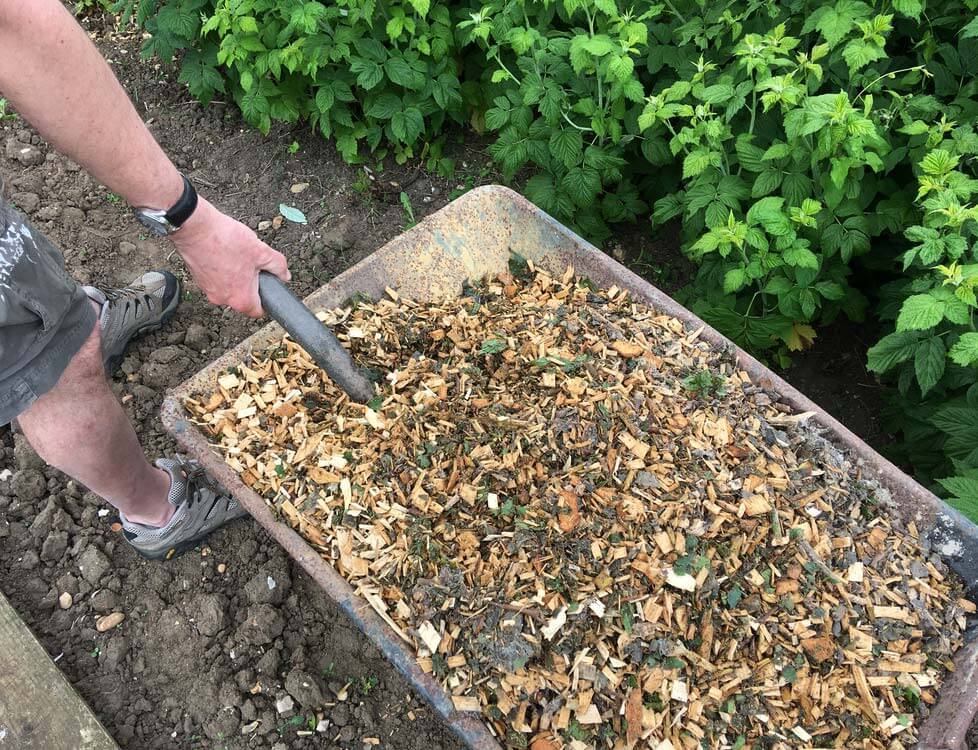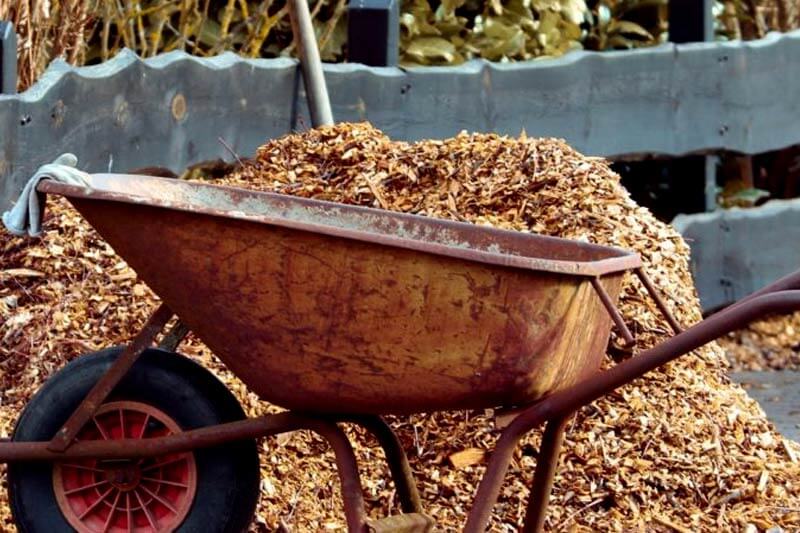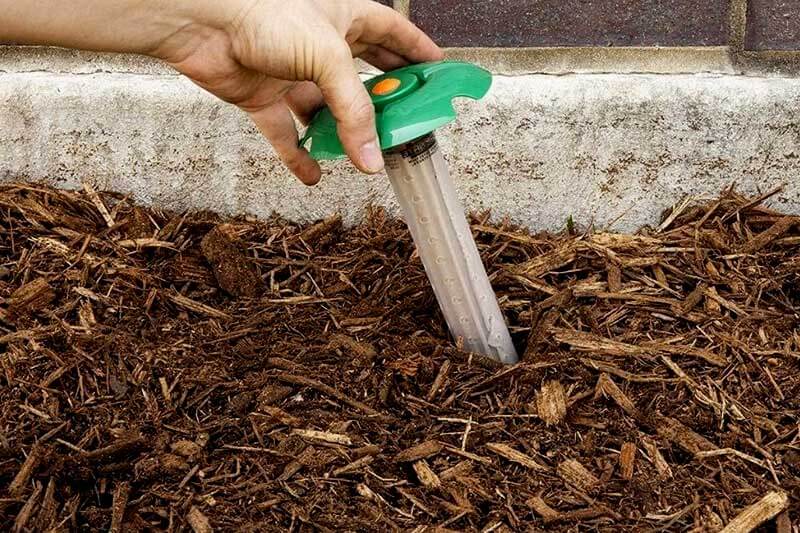Mulch is essential in landscaping. It keeps gardens and flowerbeds healthy and provides plants with moisture and insulation. However, most homeowners and landscapers often claim to have found termites in mulch. This can cause concern, especially if you lay mulch close to your house.
While mulch itself does not attract termites, it creates an inviting environment for these pests. So, while termites may not actually feed on the mulch, they certainly provide a perfect habitat for the insects to thrive and even start a colony. The layers of mulch trap heat and moisture underneath, which encourages the termites to explore while looking for food.
A termite infestation in your home can devastate the structural integrity as well as the value of the home. This article provides detailed information about mulch and termites and what to do if you find termites in your home.

Termites like a warm, moist environment near food and water sources. Mulch or stump grinding from recent tree work on your property provides the perfect setting for these bugs.
Typically, mulch used for landscaping keeps the ground moist and retains the heat in the soil. This moisture is ideal for flowers, shrubs and all kinds of plants. Mulch also contains nitrogen and phosphorus, which are critical for healthy plant growth.
Combined, all these factors make a perfect habitat for termites, ants, roaches, and other insects to build their nests.
And if the mulch contains cellulose, the bugs will find not only a home but also food to last them several weeks, during which time they may start invading your home.
What type of mulch attracts termites?
Some mulches attract termites and may expose your home to a termite invasion. These mulches may contain nitrogen and phosphorus or cellulose, which are essential requirements for the bugs to survive.
Here are the mulches that attract termites:
1. Pine straw mulch
Most people claim that pine straw mulch does not attract termites, but this may be true to a certain extent.
Termites tend to avoid pine straw mulch, but this mulch traps heat and moisture in the soil, thus providing an excellent environment for the pests to thrive.
Termites take shelter underneath this mulch and start building their colonies. These bugs build tunnels to look for food sources, and in most cases, those tunnels end up in your home.
Studies show that pine straw mulch attracts termites, but most people still cling to the idea that these mulches are termite-repellent.
2. Pine bark mulch
Pine bark mulch also attracts termites as it provides them with an ideal nesting place.
However, most people have a misconception that termites are attracted to the mulches they can feed on. This is not necessarily true because termites do not feed on pine straw or pine bark mulches.
Both of these mulches contain nitrogen and phosphorus and retain moisture and heat, which makes them attract termites and ants. So, using these mulches may expose your home to a termite and ant invasion.
3. Softwood mulch
Softwood mulches have a high cellulose content, and termites feed on cellulose. So, you will most certainly have a termite invasion if you use softwood mulches. It is, however, important to note that not all softwood mulch attracts termites.
Most homeowners use firewood mulch and pinewood mulch (all types), which are rich in cellulose. Once the termites exhaust the cellulose in these mulches, they will look for an alternative source of food, which is your home!
Using the wrong type of mulch in your flowerbed or garden exposes your home to a termite invasion.
Mulches that termites hate
Now that you have an idea of what mulches attract termites, you should know what mulch is best to repel termites.
These mulches have antifungal properties, making them resistant to termites. Using them will protect your homes against an infestation from termites, ants, roaches, centipedes, crickets, etc.
Here are the best mulches to avoid termites.
1. Cedar mulch
Cedar mulch, a byproduct of cedar trees, is a hardwood mulch containing resins that repel termites. This mulch also has a naturally occurring chemical called thujone which repels termites.
This mulch is quite costly and can last for up to 5-7 years. Since cedar is naturally reddish, it makes your garden look beautiful. Cedar mulch also improves the soil quality and enhances the health of your plants.
2. Redwood mulch
Redwood mulch is a softwood mulch and the only softwood mulch that keeps termites away.
This mulch also contains antifungal properties that keep termites away, like cypress heartwood and cedar mulch. It can last for about 1-3 years, making it a good option for homeowners looking for alternatives other than hardwood mulches.
3. Cypress heartwood mulch
Before we go further into our discussion, you should note that there is a difference between normal cypress mulch and cypress heartwood mulch.
Cypress mulch attracts termites, while cypress heartwood mulch repels termites.
Here is why.
Cypress mulch contains sapwood, which contains cellulose. As we all know, termites feed on cellulose, so this kind of mulch will most certainly attract termites.
On the other hand, Cypress heartwood has resins and antifungal properties that keep termites away. And since this mulch is made from hardwood, it can last for about 3-4 years without breaking down.
4. Melaleuca/tea tree mulch
Melaleuca mulch is another excellent choice if you are looking to add mulch to your garden. It is cheaper than cypress heartwood and cedar mulch, making it a perfect alternative if you have a tight budget. What’s more, it is a hardwood mulch that comes from the Melaleuca tree and contains tea tree oil that repels termites.
This mulch takes about 2-3 years to break down. The only downside to this mulch is that it produces a certain smell that you may not like.
When buying Melaleuca mulch, make sure it does not contain any seeds. Otherwise, you will have hundreds of Melaleuca trees sprouting in your yard.
5. Licorice root mulch
Licorice root mulch is made from steamed and grated licorice tree roots.
This mulch contains an anti-artillery fungus property that repels termites. It also contains several nutrients and maintains the carbon-nitrogen ratio in the soil, all of which are essential for healthy plant growth.
6. Treated mulch
Treated mulch is made from chemically treated timber, and it can repel termites to some extent. Usually, the timber is treated before being ground to create mulch. Some of the freshly cut areas may not be treated, making this mulch attract termites.
Why do termites hate these mulch types?
As discussed above, termites are attracted to moist and warm areas near food and water sources. These termite-repellent mulches do not provide the ideal environment for the termites to thrive.
Termite-resistant mulches do not contain cellulose and moisture, and the occurrence of natural chemicals keeps termites away. So, using these mulches will keep your home safe from a termite infestation.
Can you bring termites to your home from store-bought mulch?
Most people believe that mulch bought from supply stores could contain termites that may end up infesting their homes.
While this may not be true, it is not impossible to find termites or other bugs in mulch bought from supply stores. However, it is unlikely that the termites you find inside the bag will infest your home.
Here is why.
Termites have low chances of surviving the mulching or chipping process when bagging the mulch. More so, termites cannot survive for very long once separated from their colonies. So, the chances of termites from store-bought mulch infesting your home are slim.
On top of that, termites that feed on mulch do not survive for long periods compared to termites that feed on solid wood.

So what should I do if I find termites in store-bought mulch?
As mentioned above, it is not unlikely to find termites in the mulch you buy from your supply store.
So, once you find termites in the mulch, you can take it back to the store and buy treated or termite-resistant mulch.
However, if you have already unloaded the mulch from the truck, rake it out on the grass to expose the termites to the sun. The termites will be eaten up by ants and will die off within 12 to 24 hours.
Tips for laying mulch to avoid termites
Follow these tips to avoid termites when laying mulch around your home’s foundation.
Use termite-resistant mulch
Supply stores have all kinds of mulches made from different ingredients. You will find termite-resistant mulches like cedarwood mulch and other mulches that are appealing to termites.
Therefore, it is essential to know what kind of mulch you buy to avoid exposing your home to a termite infestation.
Termite-resistant mulch is the best option to keep termites, ants and other bugs away from your home. This kind of mulch is available in several types, and you can find even cheaper options if your budget is tight.
Use the mulch correctly
While most homeowners have gardens and flower beds, it is not surprising to find that quite a big percentage do not know how to use mulch properly.
If you do not want to deal with a termite problem, here are pointers to help you lay mulch the right way.
- Make sure the mulch is only in your yard and it does not touch any wooden areas of your home, like doors and walls.
- Lay the mulch at least 6 inches away from your home’s foundation.
- Place gravel or similar materials in the spaces between your gardening areas. This will provide a buffer zone between the mulch and your home’s foundation to help in keeping the termites away.
Mitigate moisture/keep the mulch dry
As mentioned earlier, moisture is one of the main things that attracts termites in mulch. So, you will want to avoid keeping your mulch wet as much as possible.
Although you will need to water your garden, be careful not to wet the bare strip around your home. This will keep that area dry and unattractive to termites.
Also, ensure that water from the sprinkler does not reach the walls or doors of your house.
You can also reduce the mulch layer to about two inches or less and rake it often to keep it dry at all times.
Use natural oils and juices
If you are a DIYer and like organic stuff, you can use natural oils and juices to keep pests at bay. For instance, you can spray citrus around your mulch and home to keep off termites.
Vinegar will actually kill termites, so spray some around the foundations of your home and over the mulch in your garden to keep them away.
Be vigilant
As you do all you can to keep termites away from your mulch and home, you must stay vigilant to ensure the pests do not become a problem. Watch out for any signs of termites in your garden and take the necessary steps to eliminate them as soon as possible.
If the termites are too many, or if you suspect that they have built a nest in your yard, call pest control professionals immediately to address the problem.
What are the signs of termites in mulch?
If you are a garden enthusiast and have laid mulch around your home, you may have to look out for termites.
Here are the signs you should look for if you suspect termites in your mulch.
- Live termites in the mulch
- Mud piles in the mulch
- Dead termites that ants may have killed.
- Mud tubes through which the bugs look for food sources
- Termite faeces
How can you treat termites in mulch?
Once you are sure you have a termite infestation, the next step is to eliminate them.
However, you should be very careful with the methods you use to kill the termites. Avoid using chemicals that strip the soil’s natural nutrients and potentially harm your plants.
Here are several ways you can use to get rid of termites safely.

Use diatomaceous earth
Food-grade diatomaceous earth is an excellent choice when dealing with a termite problem.
Diatomaceous earth penetrates the pests’ skin and sucks all the moisture out. This dehydrates the pest and kills it rapidly.
Food-grade diatomaceous earth is safe for your plants, pests, and humans, and it can also eliminate other types of pests.
Use boric acid
Boric acid also works the same way as diatomaceous earth.
When using boric acid, mix one teaspoon of the product with one cup of hot water. If you have a big garden, you will need to make more of the mixture.
Then, spray the mixture on the termite-infested mulch. The termites will be dehydrated and die rapidly.
Boric acid is safe for plants and the soil, but an excess amount could damage the soil.
Use nematodes
Diatomaceous earth and boric acid are effective, but they may not kill all the termites or bugs present in the mulch.
This is where nematodes come in.
Nematodes are small roundworms that penetrate the pest’s body, killing it from the inside. These are natural termite killers that do not affect the soil’s quality.
You can buy the nematodes from supply stores and sprinkle them on the affected areas.
Use this FREE service
If you cannot get rid of the termites by yourself, you can hire a pest control company to do the job for you.
The fastest and easiest way to get 3 Estimates from the most affordable pest control services near you would be by using this FREE service.
GoTreeQuotes.com quickly matches you with the 3 pest control experts voted #1 by previous users in your area.
- Scroll up to the top of the page and enter your ZIP Code in the blue form at the top of the page.
- Give us a few details about your job plus some contact information.
- Your details are forwarded on to the closest three pest control services, all voted best priced, who will also price your pest job.
IMPORTANT: There is no obligation to hire. This is a free tool and service to be used at your pleasure.

Conclusion
Although termites do not eat mulch, they retain moisture and heat in the soil, which is appealing to these pests. The only way you can avoid termites in mulch is by using termite-resistant mulch such as cedarwood, cypress heartwood and melaleuca mulches.
Also, make sure you use mulch correctly and call a professional pest control service immediately if you see any signs of termites in your mulch.
FAQ's
You can put mulch around your home, but you have to do it correctly. Mulch increases the moisture content of the soil around your home, which makes it attractive to termites. This can expose your home to a termite infestation.
Yes, termites can live in bagged mulch. The moisture inside the bag makes it an ideal habitat for the bugs. However, the termites cannot live long enough to start an infestation.
It is not necessary to remove old mulch every year. Mulch gradually breaks down, and it adds organic matter to the soil. So, removing old much will only add unnecessary work and a needless expense.
Besides, mulch can last from 1 to 5 years, depending on the kind you use. So, the mulch may still be functional after one year.



